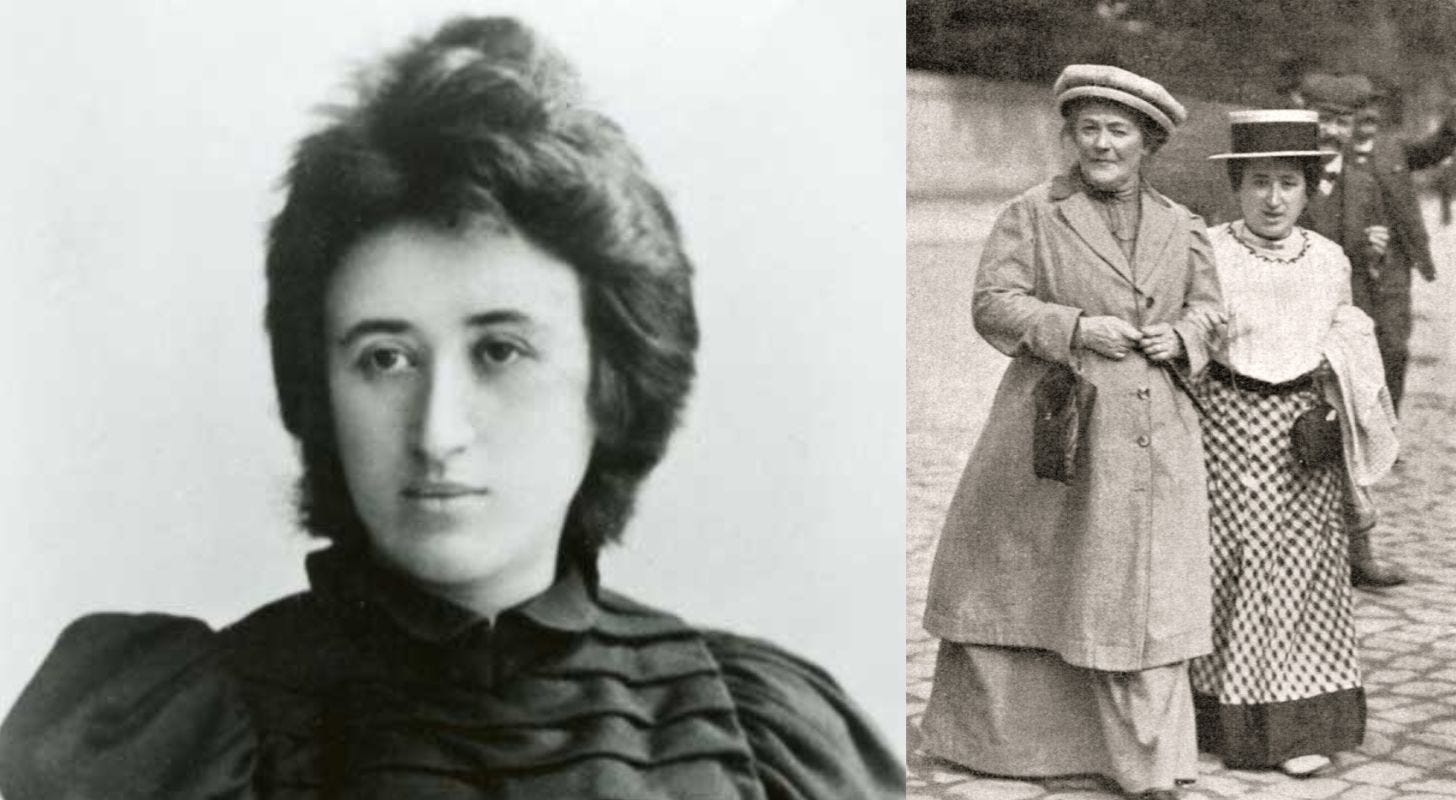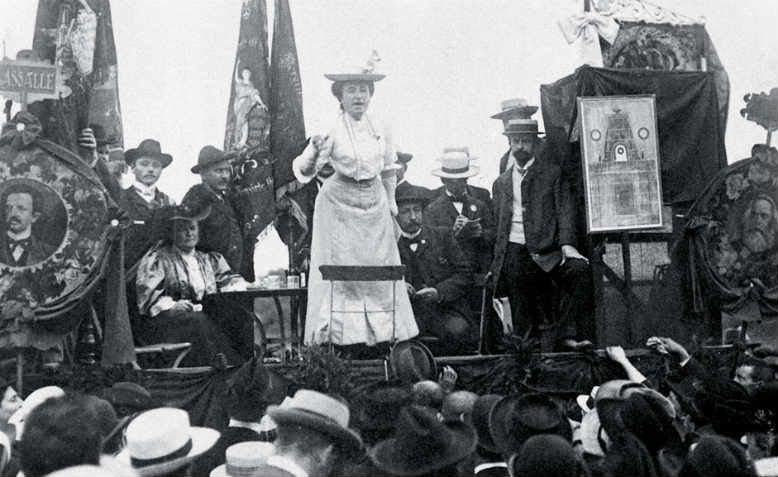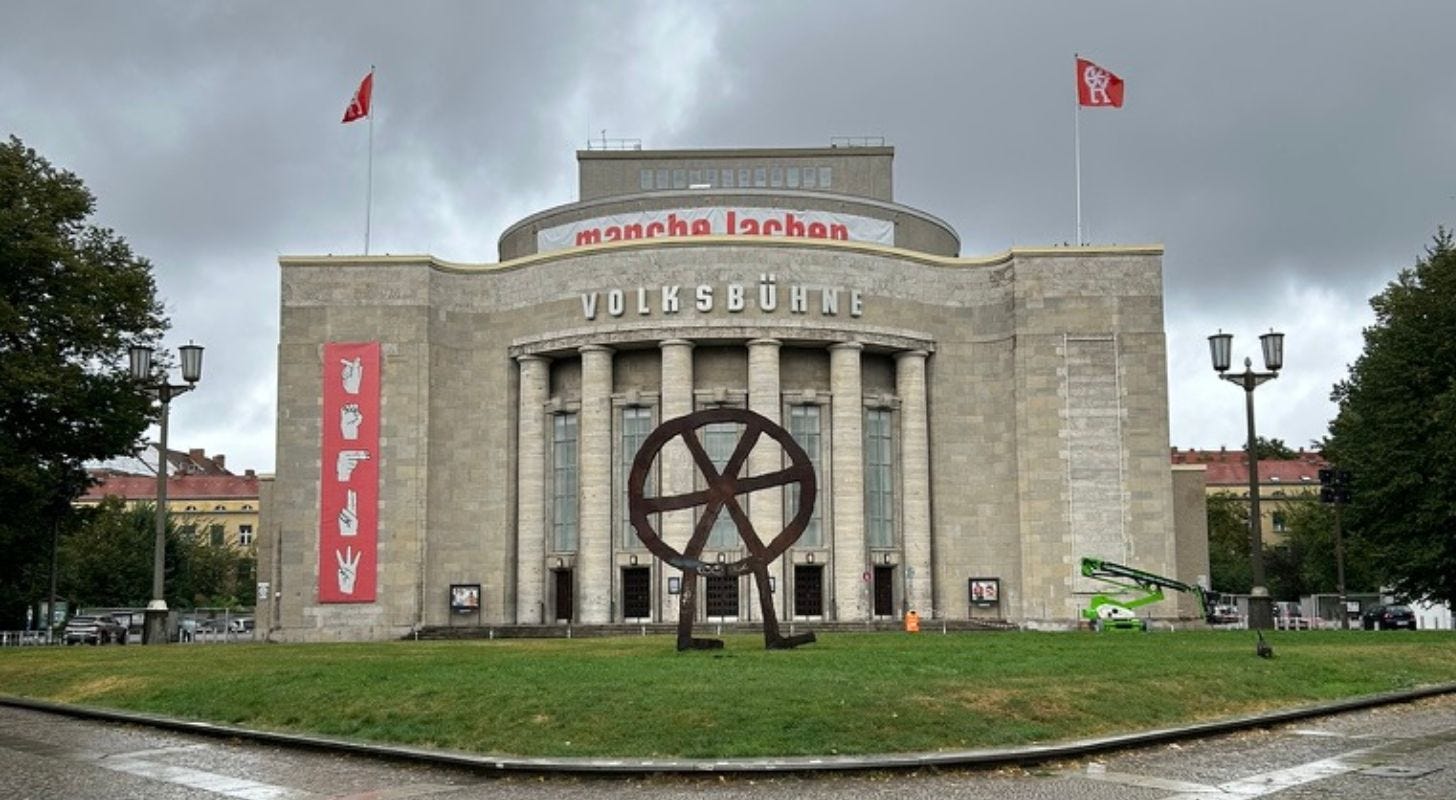🌹🎶Roses of Berlin 5: Rosa Luxemburg
A ramble following Red Rosa along the frontlines of revolutionary Berlin.
🌹🎶Roses of Berlin 5: Rosa Luxemburg
A series of rambles about Women of Berlin
Wandering the streets of Berlin this September, I wondered at the tales and trails left by women who changed the course of the city and herstory. We’ll meet everyday heroines, pious saints, dynastic Queens and political activists as I share weekly posts about my discoveries. In this final ramble, we follow Red Rosa along the frontlines of revolutionary Berlin.
Picture - (L-R) Rosa Luxemburg in Berlin 1910, Rosa-Luxemburg Straße, Berlin 2024
Oh, this "sublime silence of eternity" in which so many screams have faded away unheard. It rings within me so strongly that I have no special corner of my heart reserved for the ghetto: I am at home wherever in the world there are clouds, birds and human tears.”
- Rosa Luxemburg, Letter to Mathilde Wurm
As cloud bursts of rainy tears kissed the sun-baked streets of Berlin, I went in search of complex female revolutionary, Rosa Luxemburg. Portrayed alternately as a ‘mistaken’ or idolised martyr by her communist comrades and perfunctorily honoured on a West German postage stamp, Red Rosa was, is and shall be many things to many people.
Rozalia Luksenburg was born in Russian-controlled Poland in 1871 to two intellectual Jewish parents, Lina and Edward, who spoke Polish, German and Russian. Her liberal father and grandfather were involved in Jewish Reform and contributed to her early emerging activism. After becoming one of few Jewish students to win a scholarship to the Second Woman’s Gymnasium in Warsaw in 1884, Rosa joined the illegal Polish Proletariat Party (PP) at age 15 in 1886, whose leaders were rounded up and killed after organising a workers strike. From then on she would be found wielding her pen and presence to analyse and mobilise revolutionary activity across Poland, German and Russia.
Pursued by authorities, Rosa fled to Switzerland in 1889 where she became the first Polish woman to attain a doctorate in political economy at the University of Zurich. There she met her long-term lover and collaborator Leo Jogiches, with whom she split from the PP to co-found the Social Democracy of the Kingdom of Poland and Lithuania (SDKPiL) in 1893. She would continue to flout social convention by forging many powerful lover-comradeships. Entering a brief marriage of convenience to Gustav Lübeck in 1897 to gain German citizenship, Rosa settled in Berlin in 1898, describing her initial impression of the city as “cold, tasteless, massive – a real barracks; and the dear Prussians with their arrogance, as though every one of them had swallowed the cane with which one had once been beaten.” (Letter to the Seidels, 1898)
Picture - (L-R) Rosa with short hair age 22, Clara Zetkin and Rosa Luxemburg 1910, SDP Conference.
Positioned on the edges of society as a radically ‘other’ Jewish woman born with a limp, Rosa developed a broad, internationalist vision of socialism. Believing that emancipation could only come about through socialist revolution rather than nationalist movements, she opposed colonialism, imperialism and slavery. Lifelong friend, Clara Zetkin, Editor of Women’s Newspaper Die Gleichheit / Equality described her as “the sharp sword, the living flame of revolution,” Having met at the women’s section of the German Social Democratic Party (SDP) in 1898, the two friends led the First International Conference of Socialist Women in 1907. In 1910, Clara’s proposed International Womens Day Celebration was unanimously supported at the second women’s conference and was inaugurated in Austria, Denmark, Germany, and Switzerland on 19th March 1911. Having made then-radical choices to cut her hair short and wear a brassiere rather than a corset, in a letter to Luise Kautsky in 1911, Rosa wrote: “Imagine this, I’ve become a feminist,” whilst seeing that “Germany’s present lack of rights for women is only one link in the chain of the reaction that shackles the people’s lives.” (Women’s Suffrage and Class Struggle, 1912)
Picture - Red Rosa, Kate Evans, Verso Books
As World War I loomed, Luxemburg, led an anti-war demonstration in Frankfurt in 1914 and began publishing anti-war materials through Die Internationale, co-founded with Karl Liebknecht, Clara Zetkin and Franz Mehring, which was renamed The Spartacus League in 1916 in honour of the revolutionary gladiator who led an uprising against the Roman Republic.
“…when, as I say, the majority of people come to the conclusion that wars are nothing but a
barbaric, unsocial, reactionary phenomenon, entirely against the interests of the people, then wars will have become impossible …”
- Rosa Luxemburg, Frankfurt Trial 1914, after which she was imprisoned for a year.
Rosa was incarcerated multiple times throughout her life, including long spells in Posen and Breslau prisons during WWI. Her numerous letters, pamphlets and articles were smuggled, distributed and preserved by her friend typist-translator-activist Mathilde Jacob. Her letters reveal her fondness for her friends, family, cat Mimi and the flies and wasps with whom she shared her cells and jam rations.
Picture - Rosa the Eagle addressing a crowd in 1907 - source - Wikipedia
Having met and formed a mutual respect with Lenin in 1907, Rosa was nonetheless outspoken in her critique of the Bolshevik Party’s dictatorship in a famous passage written from Zur Russischen Revolution/ On the Russian Revolution (1918)
“Freedom only for the supporters of the government, only for members of a party—however numerous they may be—is not freedom. Freedom is always the freedom of dissenters. Not because of the fanaticism of ‘justice’, but because all the invigorating, healing and purifying aspects of political freedom depend on this essence and fail to have an effect when ‘freedom’ becomes a privilege.”
In 1922 Lenin, whilst stating she had made ‘mistakes,’ acknowledged Rosa as ‘an eagle’ who ‘will remain dear to all the future generations of socialists of the world.’
Picture: Commemoration of Luxembourg and Liebknecht, January 1978, Berlin. Photo: Wikimedia Commons
Released from prison after the Armistice of 1918, Luxemburg and Liebknecht launched into action, establishing Die Rote Fahne/ The Red Flag newspaper and the German Communist Party (KPD). Calling for violent action against the SDP, the resulting Spartacist Uprising of 5th-12th January 1919 was suppressed by the government paramilitary Freikorps, resulting in the deaths of 150-200 people. Luxemburg and Liebknecht were arrested, tortured and murdered. Liebknecht’s body was dumped outside the railings of Berlin Zoo and Rosa’s body was found 5 months later in the Landwehr Canal. She was identified by her faithful friend Mathilde, who continued her activism until deported and murdered at Theresienstadt in 1943. Rosa’s former lover and comrade Leo was assassinated whilst investigating the murders in March. In June 2019, 200,000 people attended Luxemburg and Liebknecht's joint funeral. Rosa’s coffin was decorated with her final words, written on the day of her execution.
"Tomorrow the revolution will "rise up again, clashing its weapons," and to your horror it will proclaim with trumpets blazing: I was, I am, I shall be!”
In death as in life, Rosa’s legacy has continued to be surrounded by turbulence and political machinations. She was alternately portrayed as a martyr and proponent of ‘mistaken Luxemburgism’ to serve the agendas of different left wing factions. After the Nazis destroyed the joint memorial at Friedrichsfelde Cemetery, the GDR (East German Government) instated an annual LL-Demo as a state propaganda show. Since the reunification of Berlin, this has evolved into a silent remembrance and wreath ceremony.
Here lies, buried
Rosa Luxemburg
A jewess from Poland,
A pioneer of the German working class
Killed on the orders of
The German oppressors. You, the oppressed ones,
Bury your discord.Epitaph to Luxemburg - Bertolt Brecht
Written after the restoration of the Luxemburg-Liebknecht Memorial in 1948
“I want to affect people like a clap of thunder, to inflame their minds not by speechifying but with the breadth of my vision, the strength of my conviction and the power of my expression.” - Rosa Luxemburg, Letter to Leo Jogiches (1899)
On a grey day in September, a splash of Red Rosa bleeds into the sky as the flags of the Volksbühne/The People’s Theatre flap in the rain on Rosa-Luxemburg Platz. Founded in 1914, the theatre’s early artistic directors included Max Reinhardt and Erwin Piscator, whose concept of ‘epic theatre’ was adopted by Brecht. Known originally as Bülowplatz, the square was the site of the murder of two police captains by the KPD in 1931 and an uprising against Nazis in 1933, before being dedicated to Liebknecht (1945-47) and Luxemburg from 1947. It seems a sobering and fitting place to leave this last Rose of Berlin, who bloomed amidst thorny revolutions.











